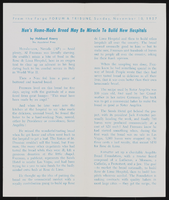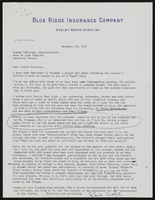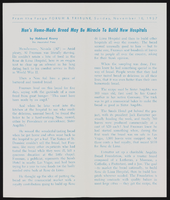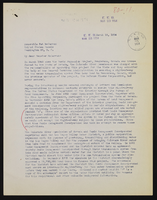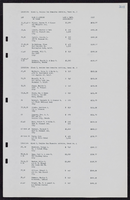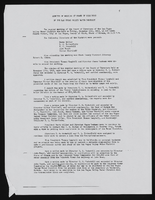Search the Special Collections and Archives Portal
Search Results
Gerry Gauthier oral history interview
Identifier
Abstract
Oral history interview with Gerry Gauthier conducted by an unknown interviewer on June 23, 2004 for the UNLV University Libraries Oral History Collection. In this interview, Gauthier talks at length about his experiences as an Army infantryman in the Philippines and as a survivor of the Bataan Death March and subsequent internment at camps in the Philippines and Japan. He first describes his upbringing and education in Michigan and his desire to enlist in the Army in 1940. He then describes his experiences of war, capture, and internment and his release after three years and five months of captivity. He also talks about his life after the war, from the extensive period of hospitalization and rehabilitation to his marriage and thirty-five year career in the U. S. Postal Service. Finally, he discusses his retirement and move to Henderson, Nevada in 1997.
Archival Collection
Robert Alton Thielke oral history interview
Identifier
Abstract
Oral history interviews with Robert Alton Thielke conducted by his grandson, Harry Stephen Lauer, on March 12, 1975 and an unknown date in 1975 for the Ralph Roske Oral History Project on Early Las Vegas. In these interviews, Thielke discusses his personal history working for railroads, gas companies, and munitions manufacturers before moving to Las Vegas, Nevada in 1948. Thielke describes life in Las Vegas during the 1940s and taking road trips in a Ford Model T roadster. He talks about how Las Vegas has changed and grown, as well as rodeos in the city. Thielke explains the history of Henderson, Nevada, manganese mining, and the history of Stewart Ranch. He also describes his recreational activities and explains that he moved out of west Las Vegas because of the increase of African Americans living in that area.
Archival Collection
Jesma and Carlyle Wilcox oral history interview
Identifier
Abstract
Oral history interview with Jesma and Carlyle Wilcox conducted by Sally Griffis on February 19, 1976 for the Ralph Roske Oral History Project on Early Las Vegas. Jesma Wilcox begins by describing her family ranch, how her father leased the property to tenants, and what it was like living without air conditioning and refrigeration. She describes using a nearby stream as a water source, recreational activities, and the Mormon settlers and missionaries who first settled on the ranch. Wilcox talks about her religious involvement with the Mormon Church and life in Las Vegas, Nevada during the mid-twentieth century, as well as how Las Vegas has changed. Wilcox, with her husband Carlyle, also discusses the history of the nuclear weapons tests. Carlyle then describes the construction of the Basic Magnesium Plant in Henderson, Nevada.
Archival Collection

